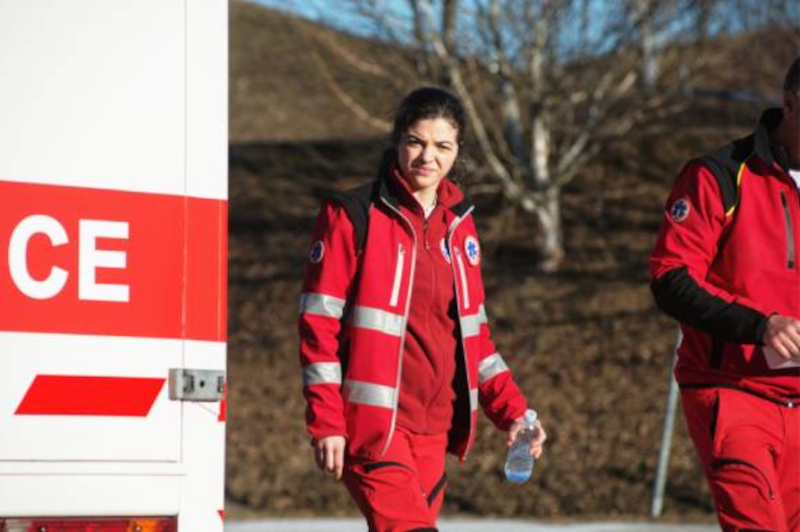Director – Janez Burger – 2023 – Slovenia, Italy, Croatia, North Macedonia – Cert. none – 83m
*****
A paramedic must deal with the aftermath of a man being kicked unconscious after people watch the incident on social media livestreaming – plays in the spirit of the Critics’ Picks Competition at the 27th Tallinn Black Nights Film Festival
The sounds of a man (Vito Weiss) being beaten up by others. No images. Mercifully.
If you lived in Slovenia, you’d be familiar with a news story about a man who was beaten up by others who livestreamed the event over social media, picking up an audience of 20 000, out of whom only a negligible number, maybe a handful, thought to call the police. That incident was the starting point for this film, which is an attempt to come to term with such events.
It’s a drama based around the three-person ambulance detail who find themselves picking up the victim of the livestreamed attack. He’s in a bad way and winds up in intensive care. Most of the ambulance pickups either die on the way to or in hospital, or they make a full recovery; this man, however, remains stable but unconscious in the ICU with no sign of either recovery or lapse.
One of the three paramedics, Lara (Diana Kolenc), is deeply affected by the incident. She visits the man in hospital and comforts the man’s understandably distraught father (Pavne Rabnohrib). Hearing his condition has improved, she messages the father about the good news, which immediately turns sour, with the father asking to know why she did it and telling her never to contact him again. It turns out she was misinformed and the man’s condition was unchanged.
Lara is close to her sister Ema (Natasa Keser) and brother-in-law. It emerges that Ema watched the video.
Videos start circulating on social media and being sent to people’s phones of the incident with bystanders there, watching. One of these bystanders kills himself. Another is the victim of a motorcycle accident to which Lara’s ambulance is called. Lara starts to fear for Ema.
The rubbish is piling up in the car park near Lara’s apartment block (because the bin men are on strike). Later, she discovers a rat in her kitchen and kills it. Her brother-in-law orders her a rat trap off the internet.
She also talks to the detective Borut (Jurig Hanigman) investigating the beating up incident. And also about the fact that she has been receiving videos of the incident on her smartphone. She likes the detective. They start to date. The incident and the videos sent to her start to adversely affect her concentration levels at work.
Ema is admitted to hospital, and her condition doesn’t look good.
For the closing scene, we are shown the video of the man being beaten up by others. With picture. Should we walk out? Should we close our eyes? There can’t be more than a couple of minutes left of the film.
Although inspired by a specific event, this fits neatly into a number of film traditions. For one thing, there are a number of films about ambulance crews at work – some fictional, some documentary – and like some of the better ones this is very good at showing us the everyday pressures of that job, with Lara and her two colleagues, including the crew leader Rok (Benjamin Krnetic), going out on calls and relaxing in their rest area.
She’s after a transfer to another job, and in a side drama, conveyed in an ongoing conversation with her two colleagues, there’s a possibility that the man in charge of the appointment may be trying to secure the job for his mistress.
It can also be seen as a horror film. How did the rat get into Lara’s apartment? Did someone, somehow, put it there? And how is it that videos of the incident are turning up on people’s phones with spectators watching within the videos – is this some sort of deepfake? (The deepfake aspect is never really explored outside its effect on those who have been inserted by deepfake technology in to the videos and to whom the videos have subsequently been sent. For more on that technology, see Another Body, Sophie Compton, Reuben Hamlyn, 2023, which also played in this year’s Tallinn.) Again, after seeing these videos, people die, which raises the spectre of Ring (Hideo Nakata, 1998), the Japanese sensation about the killer, viral videotape.
Then there’s the whole question of, why do people watch such videos? (Shades of Videodrome, David Cronenberg, 1983; “why did YOU watch it, Max?”) not to mention the business of acts perpetrated in viral videos and viewers looking at pictured guilty parties then deciding to take the law into their own hands and hunt down the perpetrators to mete out some sort of punishment (as in, Find This Dumb Little #Bitch And Throw Her Into A River, Ben Brand, 2017).
Perhaps the film to which this most closely relates is Caché / Hidden (Michael Haneke, 2005) in which a middle class couple are sent a series of videotapes relating to guilt over incidents in their past.
This is both a gripping drama, cleverly put together and boasting excellent performances, and an extraordinary attempt to tackle a pressing, international social problem.
Observing plays in the spirit of the Critics’ Picks Competition at the 27th Tallinn Black Nights Film Festival which runs in cinemas from Friday, November 3rd to Sunday, November 19th.
This article originally appeared on DMovies.org: you can find it here.
Trailer:
